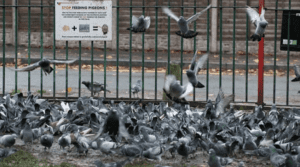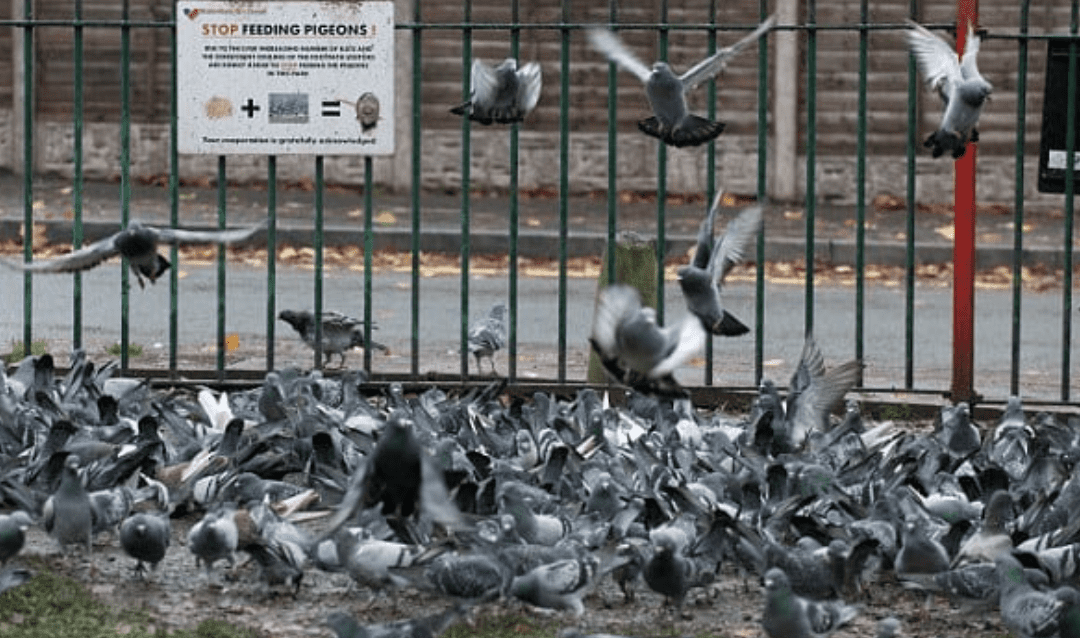Why Control Birds?
- They can lead to large-scale pig feed losses
- They can spread human and animal disease and carry parasites, and
- They can damage property.
Feed Wastage
- Feed wastage through birds can be high, particularly on outdoor pig units.
- Birds can take large volumes of sow rolls, equating to high financial losses and make it difficult to estimate quantities being eaten by the sows themselves.
- On average, bird feed intake can be 24g per bird per day, rising to 50g per bird in a single feed when herring gulls are the main species; this feed loss can cost thousands of pounds over the course of a year, and
- Feed losses can impact on sow productivity and piglet viability.

Disease
- Disease organisms spread by birds include: Brachyspira hyodysenteriae (swine dysentery) Salmonella spp., Escherichia coli, Campylobacter spp. and Listeria monocytogenes.
- Pigs are at risk of becoming infected with these organisms through poor standards of hygiene, after being in contact with droppings or if birds contaminate their food or water.
- High levels of birds on units can introduce new strains of Salmonella and re-circulate existing infections; this can result in more pigs carrying Salmonella at slaughter
- People can also be at risk of Salmonella and other infections through similar transmission methods.
Birds Most Likely to be Seen on Pig Units
- Gulls
- Crows
- Pigeons – particularly hard to eliminate
- Starlings – a particular problem during the winter
- Birds of prey – birds of prey will take young piglets and feed off dead piglets and afterbirth.
Bird Prevention
- Manage and prevent access to feed, especially feed wastage around mills, bins and feeders; if food is available, birds will always return.
- Prevent bird population build-up through practical on-farm deterrent measures such as screens; galvanised mesh screens can have a payback on saved feed losses of around 4.5 years (based on an 800-place finisher building).
- An armoury of acoustic and visual scarers will be needed to control birds as they can become habituated to ‘scaring’ mechanisms quickly, often returning to units after a few days.
- Altering the scaring mechanism every few days is the best form of prevention.
- Some birds will be more affected by certain scaring mechanisms than others so it may be necessary to use two per day and mix them up.
Options for Minimising Bird Populations
- Good feed management
- reduce waste and spills
- minimise fines from cobs
- use cobs if starlings are the main problem
- use pellets if gulls are the main problem
- Cost-effective feeding strategies
- Feed by the fenceline
- Reduce the length of the feed face
- Use ad lib feeders with covers and chains around
- Replace material/flexible feeder covers for metal ones
- Trough feeding
- Wet feeding
- Exclude birds from buildings using netting/mesh screens (keep well maintained)
- Apply plastic strips to arc fronts to exclude small birds from gaining access
- Nails on posts.
Options for Scaring Birds
- Acoustic scarers, e.g. gas bangers and distress call audio tapes; note these are effective in the short term but birds will reappear
- Material kites (tied to a weight)
- Decoy birds
- Hawk falconry flights
- Decoy birds
- Walking with an empty gun or stick of similar length behind the tractor at feeding.
By reducing the availability of feed to birds, a number of long-term benefits will be seen, including reduced direct livestock feed losses and therefore improved productivity and viability, less chance of disease transmission and a reduced need for conventional short-term bird control methods.
Targeting and designing cost-effective feeding strategies are therefore key in controlling birds, as well as a greater use of mechanical controls such as lids on feeders and barriers at feed stores. The main requirement for mechanical controls is effective maintenance of the screens used.
Controlling Birds
- Under the Wildlife and Countryside Act 1981, it is possible to control certain species of bird in the UK.
- Persons relying on this licence must be satisfied that non-lethal methods (see examples above) of resolving the problem are ineffective or impracticable.
- Keep records including dates of non-lethal methods applied, to assist licence applications.
- There are special licences for different risks.
- The licence (general) most likely to be required by pig producers is ‘To kill or take certain wild birds to prevent serious damage or disease’. This licence is granted to:
- Prevent serious damage to livestock, foodstuffs for livestock, crops, vegetables, fruit, growing timber, fisheries or inland waters.
- Prevent the spread of disease.
Pigeon Patrol Products & Services is the leading manufacturer and distributor of bird deterrent (control) products in Canada. Pigeon Patrol products have solved pest bird problems in industrial, commercial, and residential settings since 2000, by using safe and humane bird deterrents with only bird and animal friendly solutions. At Pigeon Patrol, we manufacture and offer a variety of bird deterrents, ranging from Ultra-flex Bird Spikes with UV protection, Bird Netting, 4-S Bird Gel and the best Ultrasonic and audible sound devices on the market today.
Voted Best Canadian wholesaler for Bird Deterrent products ten years in a row.
Contact us at 1- 877– 4– NO-BIRD, (604) 585-9279 or visit our website at www.pigeonpatrol.ca
Pigeon/Pigeon Patrol / Pigeons Roosting / Vancouver Pigeon Control /Bird Spikes / Bird Control / Bird Deterrent / Pigeon Deterrent? Surrey Pigeon Control / Pest /Seagull deterrent / Vancouver Pigeon Blog / Birds Inside Home / Pigeons in the cities / Ice Pigeons/ What to do about pigeons/ sparrows , Damage by Sparrows, How To Keep Raccoons Away, Why Are Raccoons Considered Pests/ De-fence / Pigeon Nesting/ Bird Droppings / Pigeon Dropping/ woodpecker control/ Professional Bird Control Company/ Keep The Birds Away/ Birds/rats/ seagull/pigeon/woodpecker/ dove/sparrow/pidgeon control/pidgeon problem/ pidgeon control/flying rats/ pigeon Problems/ bird netting/bird gel/bird spray/bird nails/ bird guard

